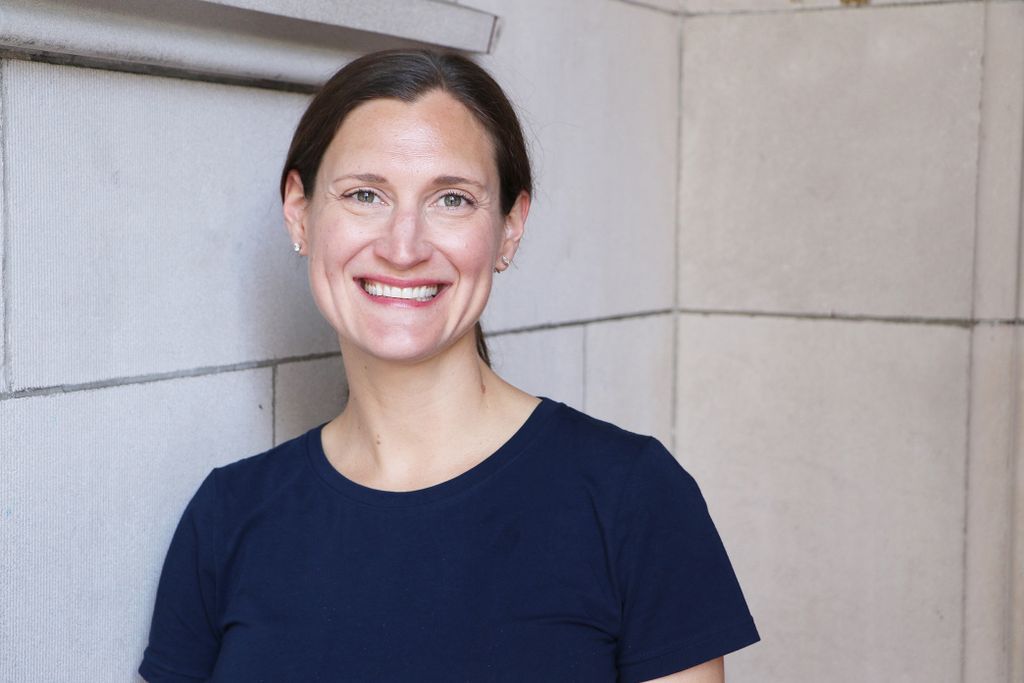Kathryn Struthers Ahmed

Assistant Professor of Childhood Literacy Education
Background
Kathryn Struthers Ahmed began her career teaching elementary school in the Bronx, New York, where she taught fourth and first grades. While working with her students, she developed a passion for teaching literacy. This led her to pursue an Advanced Literacy Specialization master’s degree from Bank Street College of Education. Professor Ahmed also became interested in how to prepare teachers to teach literacy in culturally responsive ways to minoritized youth in urban, high-poverty schools, especially given the policy constraints often present in these settings. She explored this interest further through her doctoral work in Urban Education Policy at the University of Southern California’s Rossier School of Education. Prior to joining Hunter, Professor Ahmed taught literacy methods courses and supervised student teachers at Bank Street College of Education, Barnard College, and Teachers College, Columbia University.
Education
- B.A. Psychology, Columbia University
- M.S.Ed. Childhood Education, Bank Street College of Education
- Ed.M. Advanced Literacy Specialization, Bank Street College of Education
- Ph.D. Urban Education Policy, University of Southern California
Teaching
Professor Ahmed teaches undergraduate and graduate elementary literacy methods courses. She is currently teaching the following courses:
- QSTA 401: Developmental Reading
- QSTA 410: Literacy Across the Content Areas
- CEDC 701: Beginning Elementary Literacy Methods
- CEDC 702: Advanced Elementary Literacy Methods
- CEDC 730: Perspectives on Teaching Literacy Across the Content Areas
- CEDC 740: Teaching Developmental Reading
Research
Professor Ahmed’s research focuses on preparing elementary teachers to teach literacy in culturally responsive ways to students from minoritized groups. She is particularly interested in how teacher education, teacher educators, and education policy shape the development of preservice teachers’ literacy instruction as they prepare to work in urban, high-poverty schools.
Publications
- Ahmed, K.S. (2024). To avoid or grapple with tensions? Preservice teachers learning to teach literacy for social justice. The Reading Professor, 47(1), 1-24. https://scholar.stjohns.edu/ thereadingprofessor/vol47/iss1/6
- Ahmed, K.S., Polleck, J., & Peters, L. (2023). Building community and creating change:
Collaboratively engaging diverse educational constituents in equity-based work. Action in Teacher Education, 45(3), 222-241. doi: 10.1080/01626620.2023.2222092. - Ahmed, K.S. (2023). Against the script with edTPA: Preservice teachers utilize performance assessment to teach outside scripted curriculum. Urban Education, 58(4), 612-644. doi: 10.1177/0042085919873689.
- Ahmed, K.S. (2022). Moving beyond exposure: Using picture books to teach for social justice in elementary literacy methods courses. Literacy Today, April/May/June, 50-51.
- Ahmed, K.S. & Ali, N. (2020). What do you do when you don’t know how to respond? Supporting pre-service teachers to use picture books to facilitate difficult conversations. Bank Street Occasional Paper Series, 44, 68-79.
- Ahmed, K.S. (2020). Evolving through tensions: Preservice teachers’ conceptions of social justice teaching. Teaching Education, 31(3), 245-259. doi: 10.1080/ 10476210.2018.1533545.
- Ahmed, K.S. (2020). Clouded views and silver linings: Learning to teach literacy in cooperating teachers’ classrooms. Action in Teacher Education, 42(2), 83-101. doi: 10.1080/01626620.2019.1622475.
- Beltramo, J., Stillman, J., & Ahmed, K.S. (2020). From approximations of practice to possibilities of transformation: Using Theatre of the Oppressed as rehearsals for critical teacher education. The New Educator, 16(1), 25-44. doi: 10.1080/1547688X.2019. 1670310.
- Stillman, J., Ahmed, K.S., & Castañeda-Flores, E. (2019). On cocoons, consciousness, and courage: Preparing asset-oriented teacher educators through critical pedagogies. The Educational Forum, 83(4), 432-452. doi: 10.1080/00131725.2019. 1630538.
- Ahmed, K.S. (2019). Being a “bridge builder”: A literacy teacher educator negotiates the divide between university-promoted culturally responsive pedagogy and district-mandated curriculum. Literacy Research and Instruction, 58(4), 211-231. doi: 10.1080/19388071.2019.1655683.
- Stillman, J., Ahmed, K.S., Beltramo, J.L., Casteñeda-Flores, E., Garcia, V., & Pyo, M. (2019). From the ground up: Building a teacher educator knowledge base from the situated knowledge of emerging, asset-oriented teacher educators. Asia-Pacific Journal of Teacher Education 47(3), 265-285. doi: 10.1080/1359866X.2019.1600187
- Stillman, J., & Anderson, L., with Beltramo, J., Struthers, K., & Gomez-Najarro, J. (2017). Teaching for equity in complex times: Negotiating national standards in a high-performing bilingual school. New York: Teachers College Press.
- Stillman, J., Anderson, L., & Struthers, K. (2014). Returning to reciprocity: Using dialogue journals to teach and learn from English learners. Language Arts, 91(3), 146-160.
- Stillman, J., Anderson, L., Arellano, A., Wong, P.L., Berta-Avila, M., Alfaro, C., & Struthers, K. (2013). Putting PACT in context and context in PACT: An account of teacher educators’ collaboration and adaptive response to policy mandates. Teacher Education Quarterly, 40(4), 135-157.
- Polikoff, M.S., & Struthers, K.S. (2013). Changes in the cognitive complexity of English instruction: The moderating effects of school and classroom characteristics. Teachers College Record, 115(8), 1-26.
Grants
- PSC-CUNY Research Award, Research Foundation of CUNY, 2024-2025, “Asian American novice teachers’ learning about literacy teaching in urban schools: Experiences and influential factors over time and across contexts.”
- PSC-CUNY Research Award, Research Foundation of CUNY, 2023-2024, “The Power of Assignments in Preparing Preservice Teachers to Create Equity-based, Culturally Sustaining Literacy Curriculum”
- PSC-CUNY Research Award, Research Foundation of CUNY, 2020-2021, “Preservice Teachers Learning to Teach Literacy: A Cultural Historical Activity Theory Analysis”
- PSC-CUNY Research Award, Research Foundation of CUNY, 2019-2020, “Clouded Views and Silver Linings: Learning to Teach Literacy in Cooperating Teachers’ Classrooms”
- PSC-CUNY Research Award, Research Foundation of CUNY, 2018-2019, “Asymmetrical Development of Perspectives and Practice: Learning to Teach Literacy in High-poverty Schools”

